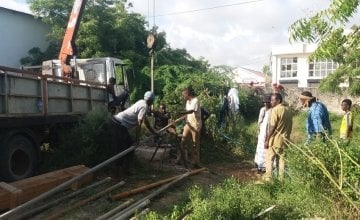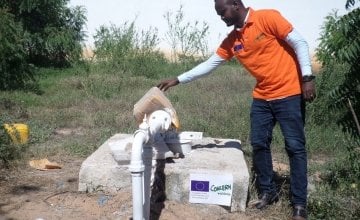
Read our 2024 annual report

Knowledge Hub
Crisis averted in a hospital in Somalia

What happens when the sole water supply to a hospital fails? Lifesaving care abruptly halts and lives that are already in danger become critical. This is the story of how a hospital in Somalia narrowly averted crisis when its only water supply failed.
Hospital in crisis
Banadir Hospital, a national referral hospital for maternal and child health, operates in the midst of this displacement and insecurity, caring for approximately 1,000 inpatients at any one time. Under seemingly impossible conditions, the dedicated staff admit up to 100 children daily for paediatric care, deliver 15-16 babies a day, treat HIV, TB and Cholera and perform lifesaving surgeries.
At Banadir Hospital, Concern Worldwide supports the stabilisation centre for children under five suffering from the most life threatening form of malnutrition – severe acute malnutrition. This includes supporting payments for doctors and nurses, providing specialised training to build the capacity of staff, as well as supporting the day-to-day running of the centre.
Failed water supply
All of the hospitals lifesaving services are reliant on water and unfortunately Banadir has only one water supply – from a well. When the water supply failed there was no backup plan and by the time the staff at the hospital had noticed the failure, the water tanks had already emptied.
As Doctor Lul Mohammed, the Assistant Hospital Director explains, this put the lives of patients in critical danger.
“This was really a crisis that needed immediate attention. Services would have to stop. We would have to refuse new admissions. Mothers were already referred to another centre that morning. However no other hospital could absorb all our patients and most are too unwell to go home.
There was the serious potential of an outbreak of disease. Imagine no water for staff to wash their hands, for sanitation, for cleaning. The situation doesn’t bear thinking about. It really was an imminent crisis.”

Swift action, saved lives
Hospital management immediately contacted Concern Health Officer, Dr. Hodan, about the water supply cut and Dr. Hodan was on-site within an hour. He coordinated Concern managers and technicians to identify the problem and fix the water supply as fast as possible.
The team of technicians worked late into the evening to install the new pump and the supply of water was restored by nightfall.
Thanks to support from European Commission’s Civil Protection and Humanitarian Aid Department (ECHO), Concern were able to respond to the most immediate needs in a time-frame that saves lives. As Dr. Lul Mohammed explains, guaranteed support from ECHO is crucial.
“We are very thankful. Concern always responds with urgency. We are confident when contacting Concern, as they always assist. Their support to the stabilisation centre is deeply appreciated here.”
We’d love to tell you more about our life changing work in world’s poorest countries.


